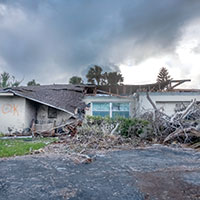 Tornadoes may upend insurance market, too
Tornadoes may upend insurance market, too
STORY BY PIETER VANBENNEKOM (Week of October 24, 2024)
The tornadoes spawned two weeks ago by Hurricane Milton wreaked historic destruction in the Central Beach area of Vero – and they also once again upset the applecart in Florida’s volatile insurance market just when it seemed on its way to finding a delicate balance.
The new X-factor in the what-kind-of-and-how-much-insurance-do-I-need equation for homeowners here is the all-too-frightening evidence in Bethel Creek and other island neighborhoods that winds from medium-strength tornadoes pose a far more powerful threat than winds from a typical hurricane.
So the new question facing homeowners who had decided to eliminate the most expensive part of their insurance policies – meaning coverage for wind damage (or go “ex-wind” in insurance parlance) – is whether they might want to reconsider that decision.
“It wouldn’t surprise me at all if people, after seeing the destruction from the tornado, would get back into wind policies for their homes,” says Julie Hauf, a local attorney with 20 years’ experience in the Florida insurance field.
Hauf says she knows of one homeowner in the hard-hit Bethel Creek area on the barrier island who had decided to “go ex-wind” in the latest renewal of his insurance policy to save costs. His home suffered some damage, but Hauf said she believes it wasn’t catastrophic.
“But this is a bet that some people took and lost,” says Harry Howle, a former Vero Beach mayor who recently added a real estate license to his insurance business. “They will now have a much more burdensome out-of-pocket expense” repairing or replacing their home.
Howle added that in some cases, it may not have mattered much whether people would pay the hefty insurance company premiums or their own repair costs.
For a home with a $3 million replacement cost and a 5 percent deductible for wind coverage, between the sky-high premium and the big deductible amount, homeowners would have to incur more than $150,000 in damages to get any benefit from insurance.
“Ultimately,” Howle said, referring to the question whether people will be more likely to get wind insurance again, “it depends on the individual – how much risk they are willing to take, and how much risk they can afford.”
John and Penny Eshleman, who lost their home in the Bethel Creek area to the tornado, had decided the last time their homeowners’ insurance policy came up for renewal that they were not willing to take the risk, even though they saw that in the rate breakdown, wind or hurricane coverage represented the lion’s share of the cost of the premium.
“Of course, now we’re glad we kept wind coverage,” Eshleman said. “We love it here and with what we’ll hopefully get from the insurance company, we plan to rebuild right here,” his wife Penny added.
No one has any idea yet what the total claims for tornado damage could be, but whatever the number is, the results will be disastrous for both residents and business owners, as well as for the insurance companies that will have to pay out on some, but not all policies, predicts Victor Dalrymple, an insurance agent with more than 20 years’ experience along the Treasure Coast.
“It’s hard to say who’ll get the worst of it, the residents and business owners or the insurance companies,” said Dalrymple, “but I would say that both probably will.” Hauf agreed, saying that both sides, policy holders as well as insurance companies, will be hit hard, and will most likely need some assistance from both federal and state authorities to survive.
Agents from the Federal Emergency Management Agency (FEMA) arrived in Indian River County last week to assess disaster relief needs, and Florida State Insurance Commissioner Michael Yaworsky announced an amendment to a state emergency order for Indian River and several other counties extending grace periods for filing claims and preventing insurance companies from canceling or non-renewing policies during the period of the cleanup.
Hauf, the local insurance lawyer, advised people with potential insurance claims for damage to document everything, possibly with before-and-after pictures to support claims for lost content of homes, and perhaps even keep personal journals detailing what people have done.
“People may be entitled to more compensation than they think,” said Hauf, referring specifically to alternate living expenses if they had to go to a hotel because their homes were not habitable after the storm. She warned, however, that the mere lack of A/C because of a power outage does not make a home unlivable by insurance standards.
Tornadoes with winds upwards of 150 mph that destroyed just about everything in their path had not been on most people’s radar so far, and thus had not factored into most insurance decisions.
“We had not seen this kind of tornadic activity dating back to well before the 2004 hurricanes,” Dalrymple said, referring to hurricanes Jeanne and Francis that hit Vero Beach that year in quick succession.
In the wake of the dramatic increases in insurance costs in Florida over the last couple of years caused by billion-dollar insurance company losses from past hurricanes, mostly along the Gulf Coast, many homeowners in our area who do not have a mortgage and aren’t forced by banks to carry complete coverage had decided to forgo wind coverage as the most expensive part of any insurance package.
Typically, they would continue to have a policy for fire and general liability, and perhaps a separate one for flooding, but would become self-insured for wind damage.
They believed that their homes – probably with a new roof, impact glass windows and other improvements – could withstand even a direct hit from a Category 1 or Category 2 hurricane apart from some pool furniture being blown around. “A lot of people thought that they could keep their losses to a minimum from a small hurricane,” Dalrymple said.
If the new reality of the threat posed by tornadoes gets some residents to rethink their decision to skip wind coverage, they will find it expensive – if they can get it at all. Many probably will wind up with Citizens, the state-owned insurer of last resort and often the only one left in the market after the withdrawal of most national insurers from the state of Florida.
Rates still vary widely depending on the age of the structure, the building quality and even upon the insurance carrier itself. But some agents said that a typical island home that could list for sale at around $2 million may easily be assessed $20,000 or $25,000 a year in insurance premiums for wind coverage alone.
One homeowner on the mainland a few miles from the beach whose house was not touched by the tornado said he’s sticking it out without wind coverage in his insurance policy. “This was such an unusual event. It’s like a one-in-a-million chance,” he said, “that I don’t think it’s very likely to repeat itself.”
All local experts agree that it’s too early to tell if Milton will have an immediate effect on homeowner insurance rates being offered in general, but if the market response is similar to the one experienced after Hurricane Ian struck the West Coast a couple of years ago, there will be a slow “tail response,” meaning it’ll take some time before things settle out. Since insurance is a regulated industry, any requested rate increases would also have to be approved by the appropriate state oversight authorities.
“It’ll probably be springtime next year for seeing any effect on rates,” Dalrymple predicted, “but since rates are already at a historic top end, it’s difficult to say where they can go next.”
Howle agreed. “After huge increases in the past years, sometimes as much as quadruple (the previous rates), the rates appear to be remaining just about equal this year. I had hoped for a reduction, but I am beginning to realize we may never see a significant drop in premiums in the future,” he said.



